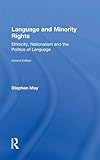Language and minority rights:
Material type: TextPublication details: New York: Routledge, 2012.Edition: 2nd edDescription: xiv, 434pISBN:
TextPublication details: New York: Routledge, 2012.Edition: 2nd edDescription: xiv, 434pISBN: - 9780805863079
- 306.449 MAY
 Book
Book
| Item type | Current library | Call number | Status | Date due | Barcode | |
|---|---|---|---|---|---|---|
 Book
Book
|
IIM Kashipur | 306.449 MAY (Browse shelf(Opens below)) | Available | 5099 |
Includes index.
The second edition addresses new theoretical and empirical developments since its initial publication, including the burgeoning influence of globalization and the relentless rise of English as the current world language. May’s broad position, however, remains largely unchanged. He argues that the causes of many of the language-based conflicts in the world today still lie with the nation-state and its preoccupation with establishing a 'common' language and culture via mass education. The solution, he suggests, is to rethink nation-states in more culturally and linguistically plural ways while avoiding, at the same time, essentializing the language-identity link. This edition, like the first, adopts a wide interdisciplinary framework, drawing on sociolinguistics, applied linguistics, sociology, political theory, education and law. It also includes new discussions of cosmopolitanism, globalization, the role of English, and language and mobility, highlighting the ongoing difficulties faced by minority language speakers in the world today.
There are no comments on this title.

